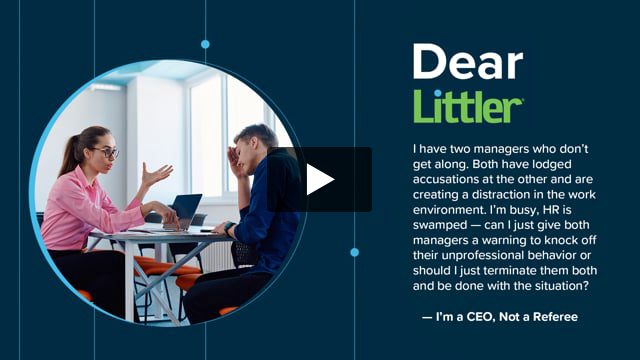Information contained in this publication is intended for informational purposes only and does not constitute legal advice or opinion, nor is it a substitute for the professional judgment of an attorney.
Dear Littler,
I’m the CEO of a medium-sized business. We have a great, but overworked, HR department. Because we are relatively small, everyone knows everyone, and we’re all friends. At least I thought so. Turns out I have two managers who don’t get along. Last week, one manager, Alen, complained to HR that the other manager, Betty, made some pretty unprofessional comments to him during an argument over production goals. In front of their subordinates no less! The next day, Betty complained about Alen to HR and alleged that he’s made sexist remarks to her. I’m busy, HR is swamped—can I just give both managers a warning to knock it off or should I just terminate them both and be done with the situation?
—I’m a CEO, Not a Referee
Dear I’m a CEO, Not a Referee,
Your situation is both frustrating and all too common. You are trying to run a business, HR is very busy, and now your managers do not get along. I can appreciate your instinct to want to discipline/terminate Alen and Betty in an effort to treat them “equally.” However, what if one (or both) did not behave in the manner complained of? What if this is the first time this behavior has been raised, but has been going on for a long time? What if Alen and Betty’s subordinates have been subjected to the same inappropriate behavior? The point is, you don’t know how much you don’t know. There are too many unknowns to make an informed decision that will affect the livelihood of your employees as well as the reputation of your company. In situations like this, you should consider conducting a neutral workplace investigation using a third party.
Why should you bother with a workplace investigation? There are many important reasons to do so:
- Workplace investigations create and promote a safe work environment. Your employees work hard for you and deserve to have a workplace where they feel safe. Part of that feeling comes from knowing that if they raise a concern, their employer will take it seriously and look into the matter. In other words, they will feel heard.
- Workplace investigations also limit a potential “snowball effect.” What if Alen/Betty behave this way all the time? A workplace investigation can determine if there is a bad actor now, when there is only one complaint. Not acting could let the behavior continue and potentially lead to your dealing with a class of complainants.
- Workplace investigations allow you to control the situation. If you conduct an effective workplace investigation and remedy the situation, the complainant is less likely to go to a third party for help or file a complaint with a state or federal agency.
- Workplace investigations also prevent reputational harm. In a social media-driven world, word spreads fast. Being known as an employer that doesn’t respond to complaints, could cause you to lose current talent and lead potential applicants to look elsewhere.
Now we know why it is important to conduct a workplace investigation, so the question becomes who should perform the investigation? In some circumstances, a well-trained HR employee may suffice. However, in a situation like this where “everyone knows everyone” and are friends, you should consider having a third party conduct the investigation. By doing so, you ensure that the investigator has experience in performing this function and that the investigation remains neutral, as the third party won’t have a relationship with either complainant. Moreover, it takes emotion out of the investigation, as a third-party investigator won’t have any background with the witnesses. Additionally, it sends a message to managers that you take the matter so seriously that you are hiring a third party to determine what happened.
Once you have found a well-qualified and experienced workplace investigator, they can conduct a confidential and neutral investigation where they will:
- Meet with Alen and Betty for confidential witness interviews to get their full account and cover all allegations raised—including responding to concerns raised by the other.
- Review all documentary evidence.
- Meet with other witnesses for confidential interviews that may be able to shed light on the matter.
- Draft an investigative report clearly outlining the allegations, evidence, and findings.
In summary, when an employee at any level raises a workplace concern, you should conduct a confidential and neutral workplace investigation so that you can make an informed decision on how best to handle the matter. Doing so will not only protect your company and its reputation, but ensure that your employees are safe, feel heard, and want to come to work each day.



